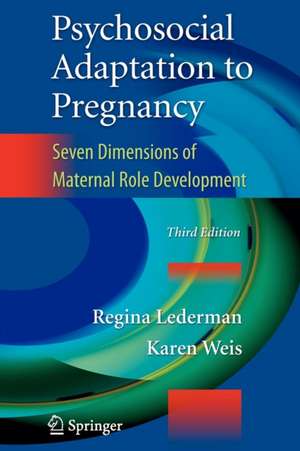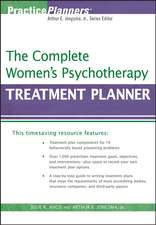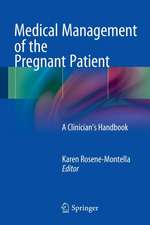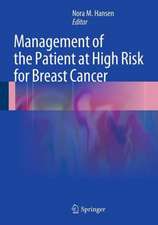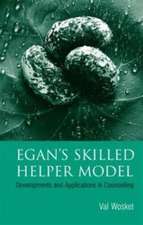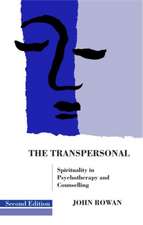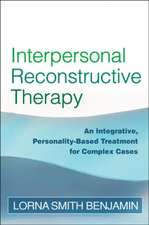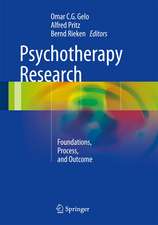Psychosocial Adaptation to Pregnancy: Seven Dimensions of Maternal Role Development
Autor Regina Lederman, Karen Weisen Limba Engleză Paperback – 16 noi 2010
Preț: 718.29 lei
Preț vechi: 756.09 lei
-5% Nou
Puncte Express: 1077
Preț estimativ în valută:
137.46€ • 142.98$ • 113.48£
137.46€ • 142.98$ • 113.48£
Carte tipărită la comandă
Livrare economică 15-29 aprilie
Preluare comenzi: 021 569.72.76
Specificații
ISBN-13: 9781441981752
ISBN-10: 1441981756
Pagini: 344
Ilustrații: XV, 324 p. 1 illus.
Dimensiuni: 155 x 235 x 18 mm
Greutate: 0.48 kg
Ediția:3rd ed. 2009
Editura: Springer
Colecția Springer
Locul publicării:New York, NY, United States
ISBN-10: 1441981756
Pagini: 344
Ilustrații: XV, 324 p. 1 illus.
Dimensiuni: 155 x 235 x 18 mm
Greutate: 0.48 kg
Ediția:3rd ed. 2009
Editura: Springer
Colecția Springer
Locul publicării:New York, NY, United States
Public țintă
ResearchCuprins
Psychosocial Adaptation in Pregnancy: Assessment of Seven Dimensions of Maternal Development.- Acceptance of Pregnancy.- Identification with a Motherhood Role.- Relationship with Mother.- Relationship with Husband or Partner.- Preparation for Labor.- Prenatal Fear of Pain, Helplessness, and Loss of Control in Labor.- Prenatal Fear of Loss of Self-Esteem in Labor.- Prenatal and Postnatal Psychosocial Adaptation in Military Women.- Prenatal Adaptation Among Multigravidas.- Methods of Assessment: Psychosocial Adaptation to Pregnancy Questionnaire Scales and Interview Schedules, and Review of Interventions to Enhance Adaptation.
Recenzii
From the reviews of the third edition:“This book, which describes seven specific dimensions of maternal emotional health during pregnancy, is based on the authors’ research into psychosocial risk factors and potential interventions. … The audience … includes Lamaze and other prenatal educators, as well as psychiatrists, psychologists, social workers, marriage and family therapists, professional counselors, the general public, and pregnant women. … This is an excellent book. … Anyone who conducts clinical activities with women of childbearing age will find this book informative.” (Gary B. Kaniuk, Doody’s Review Service, March, 2010)
Notă biografică
Regina Lederman, MNEd, MA, PhD, is a behavioral scientist, as well as a nurse and a practicing marital and family therapist, who also has 30 years of research experience in the field of maternal psychosocial development. She has published extensively, both original research and reviews, on intervention approaches to decrease maternal anxiety and promote adaptation to pregnancy. Dr. Lederman is a Professor in the School of Nursing and in the Department of Preventive Medicine and Community Health at the University of Texas Medical Branch in Galveston. She has an extensive writing background of scientific journal articles, books and questionnaires pertaining to pregnancy, childbirth, and early adaptation to motherhood. She has been editor of International Journal for Psychosomatic Obstetrics and Gynaecology, and most recently served as a consultant on a pregnancy and postpartum adaptation assessment project conducted with four branches of the military. An earlier edition of the proposed book, published by Prentice-Hall in 1985, received the American Journal of Nursing Book of the Year Award. She is a member of the Society of Behavioral Medicine, the Nurses Association of the American College of Obstetrics and Gynecology, the American Nurses Association, the Society for Research in Child Development, the American Association for the Advancement of Science, and the American Society for Psychosomatic Obstetrics and Gynecology.
Textul de pe ultima copertă
Psychosocial Adaptation to Pregnancy: Seven Dimensions of Maternal Role Development
Regina Lederman, University of Texas Medical Branch, Galveston Karen L. Weis, USAF School of Aerospace Medicine, Brooks City-Base TX
The links between a pregnant woman’s physical health and her baby’s subsequent development are widely known. Less well understood are the behavioral and emotional processes that develop during the same nine months. In Psychosocial Adaptation to Pregnancy, seven dimensions of maternal emotional health are identified—including acceptance of the pregnancy, motivation to take on the role of motherhood, relationships with husband/partner and with her own mother, preparation for labor, self-esteem, and sense of control—that have significant impact on delivery, postpartum adaptation, infant health, and early childhood development. Backed by the authors’ original research and interviews, the book provides readers with a first-of-its kind analysis of the role of these core functions throughout pregnancy, as well as practical materials for use with pregnant clients in the form of assessment tools and evidence-based interventions for promoting positive development. It is particularly noteworthy that the Surgeon General of the United States has recommended measurement of prenatal psychosocial and behavioral risk factors to improve the screening of psychosocial risks and responses for purposes of addressing these risk factors.
Key features of the book:
Theoretical framework with rationales for the seven psychosocial dimensions.
How these phenomena may differ between first and later pregnancies.
Assessment instruments with excellent properties, including the Prenatal Self-Evaluation Questionnaire and the Postnatal Self-Evaluation Questionnaire.
Therapeutic and counseling intervention strategies to improve adaptive development in each of the seven psychosocial dimensions.
Findingsspecific to women in diverse cultural groups, plus a chapter devoted to women in the military and military spouses.
Discussion of salient issues of pregnancy, including physical changes, body image, intimacy, trust, and ambivalence.
Psychosocial Adaptation to Pregnancy is a significant addition to the psychosocial assessment literature, a needed resource for clinical and health psychologists, clinical social workers, marriage and family therapists, professional counselors, and obstetrical nurses. It is also adaptable to undergraduate and graduate courses in maternal reproductive health and obstetrical nursing. The course can be taught as an assessment and intervention workshop, and as a continuing education course throughout the U. S.
Regina Lederman, University of Texas Medical Branch, Galveston Karen L. Weis, USAF School of Aerospace Medicine, Brooks City-Base TX
The links between a pregnant woman’s physical health and her baby’s subsequent development are widely known. Less well understood are the behavioral and emotional processes that develop during the same nine months. In Psychosocial Adaptation to Pregnancy, seven dimensions of maternal emotional health are identified—including acceptance of the pregnancy, motivation to take on the role of motherhood, relationships with husband/partner and with her own mother, preparation for labor, self-esteem, and sense of control—that have significant impact on delivery, postpartum adaptation, infant health, and early childhood development. Backed by the authors’ original research and interviews, the book provides readers with a first-of-its kind analysis of the role of these core functions throughout pregnancy, as well as practical materials for use with pregnant clients in the form of assessment tools and evidence-based interventions for promoting positive development. It is particularly noteworthy that the Surgeon General of the United States has recommended measurement of prenatal psychosocial and behavioral risk factors to improve the screening of psychosocial risks and responses for purposes of addressing these risk factors.
Key features of the book:
Theoretical framework with rationales for the seven psychosocial dimensions.
How these phenomena may differ between first and later pregnancies.
Assessment instruments with excellent properties, including the Prenatal Self-Evaluation Questionnaire and the Postnatal Self-Evaluation Questionnaire.
Therapeutic and counseling intervention strategies to improve adaptive development in each of the seven psychosocial dimensions.
Findingsspecific to women in diverse cultural groups, plus a chapter devoted to women in the military and military spouses.
Discussion of salient issues of pregnancy, including physical changes, body image, intimacy, trust, and ambivalence.
Psychosocial Adaptation to Pregnancy is a significant addition to the psychosocial assessment literature, a needed resource for clinical and health psychologists, clinical social workers, marriage and family therapists, professional counselors, and obstetrical nurses. It is also adaptable to undergraduate and graduate courses in maternal reproductive health and obstetrical nursing. The course can be taught as an assessment and intervention workshop, and as a continuing education course throughout the U. S.
Caracteristici
A unique analysis maternal psychosocial development during pregnancy through seven dimensions that serve as the foundation for assessment Utilizes all new psychometric instruments that parallel the responses made by expectant women
